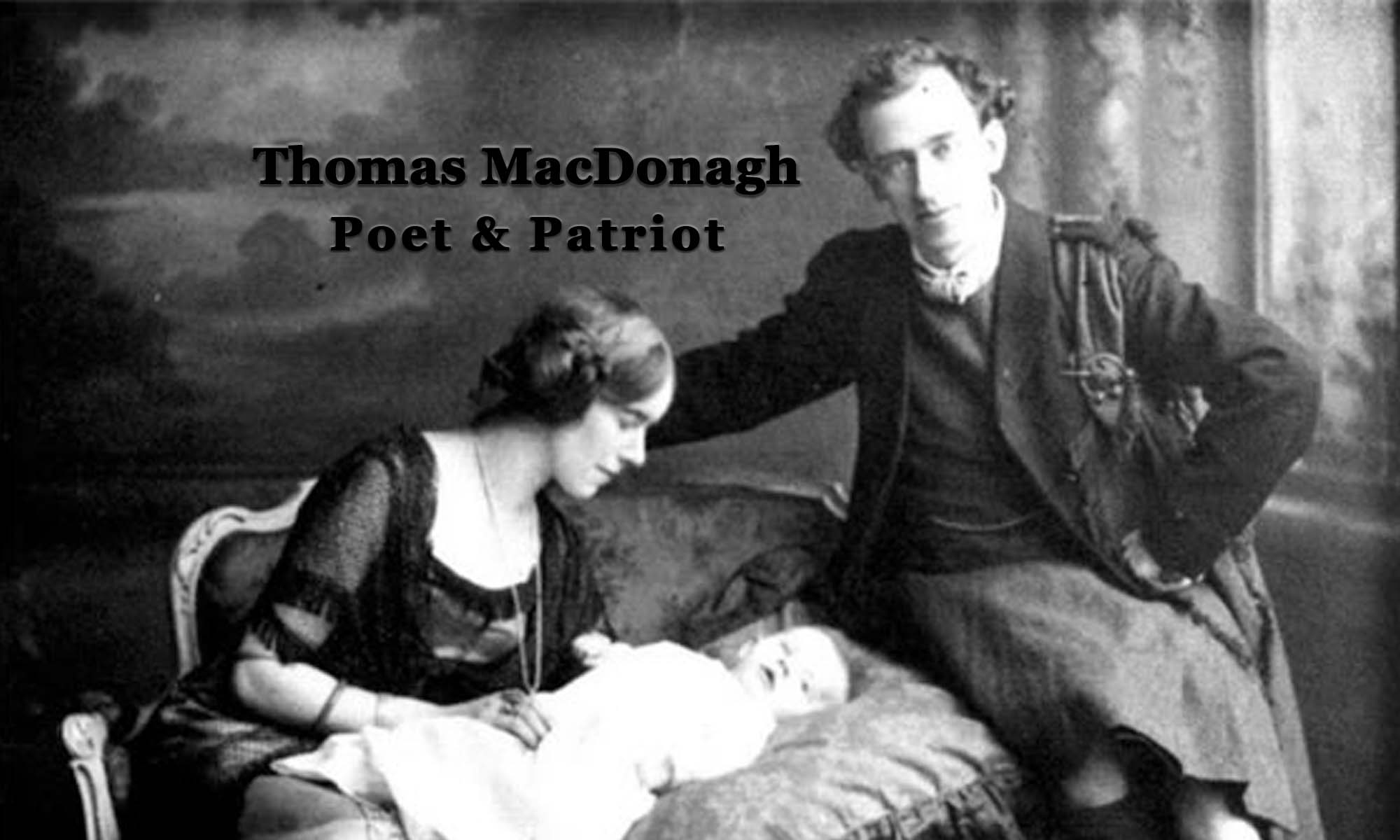Thomas MacDonagh is thought to have made this speech at his court-martial. Someone had apparently transcribed the speech at the court-martial and sneaked a it out. Copies of the speech started to circulate around Dublin in the months following his execution. There has never been conclusive evidence that the following speech is entirely accurate.
Thomas MacDonagh ‑ It would not be seemly for me to go to my doom without trying to express, however inadequately, my sense of the high honour I enjoy in being one of those predestined to die in this generation in the cause of Irish freedom. You will, perhaps, understand this sentiment, for it is one to which an Imperial poet of a bygone age bore immortal testimony “It is sweet and seemly to die for one’s country.” You would all be proud to die for Britain, your Imperial patron, and I am proud and happy to die for Ireland, my glorious Fatherland.
A Member of the Court ‑ You speak of Britain as our ‘Imperial patron’. . .?
Thomas MacDonagh ‑ Yes. For some of you are Irishmen and Britain is not your country.
Member of the Court ‑ And what of your Imperial patron, What of Germany? Would you die for her?
Thomas MacDonagh ‑ Not if Germany had violated and despoiled my country, and persisted in with holding her birthright of freedom.
President of the Court ‑ Better not interrupt the prisoner.
Thomas MacDonagh ‑ There is not much left to say. The Proclamation of the Irish Republic has been adduced in evidence against me as one of the Signatories. I adhere to every statement in the Proclamation. You think it already a dead and buried letter, but it lives, it lives. From minds alight with Ireland’s vivid intellect it sprang; in hearts aflame with Ireland’s mighty love it was conceived. Such documents do not die.
The British occupation of Ireland has never for more than one hundred years been compelled to confront in the field of fight a Rising so formidable as that which overwhelming force has for the moment succeeded in quelling. This Rising did not result from accidental circumstances, it came in due recurring season as the necessary outcome of forces that are ever at work. The fierce pulsation of resurgent pride that disclaims servitude may one day cease to throb in the heart of Ireland. but the heart of Ireland will that day be dead. While Ireland lives, the brains and brawn of her manhood will strive to destroy the last vestige of British rule in her territories. In this ceaseless struggle there will be, as there has been and must be, an alternate ebb and flow, but let England make no mistake, the generous high‑bred youth of Ireland will never fail to answer the call we pass on to them, will never fail to blaze forth in the red raveof war to win their country’s freedom; other and tamer methods they will leave to other and tamer men, but they must do or die.
It will be said our movement was doomed to failure‑it has proved so. Yet it might have been otherwise. There is always a chance of success for brave men who challenge fortune. That we had such a chance none know so well as your statesmen and military experts.
The mass of the people of Ireland will doubtlessly lull their conscience to sleep for another generation by the exploded fable that Ireland cannot successfully fight England. We do not profess to represent the mass of the people of Ireland. We stand for the intellect and soul of Ireland. To Ireland’s soul and intellect the inert mass, drugged and degenerate by ages of servitude, must in the destined day of resurrection render homage and free service, receiving in return the vivifying impress of a free people.
Gentlemen, you have sentenced me to death, and I accept your sentence with joy, since it is for Ireland I am to die.
I go to join the goodly company of men who died for Ireland, the least of whom is worthier far than I can claim to be, and that noble band are themselves but a small section of the great, unnumbered company of martyrs, whose Captain is the Christ who died on Calvary. Of every white‑robed knight of all that goodly company we are the spiritual kin. The forms of heroes flit before my vision, and there is one, the star of whose destiny chimes harmoniously with the swan song of my soul. It is the great Florentine, whose weapon was not the sword, but prayer and preaching; the seed he sowed fructifies to this day in God’s Church.
Take me away, and let my blood bedew the sacred soil of Ireland. I die in the certainty that once more the seed will fructify.
-Thomas MacDonagh
